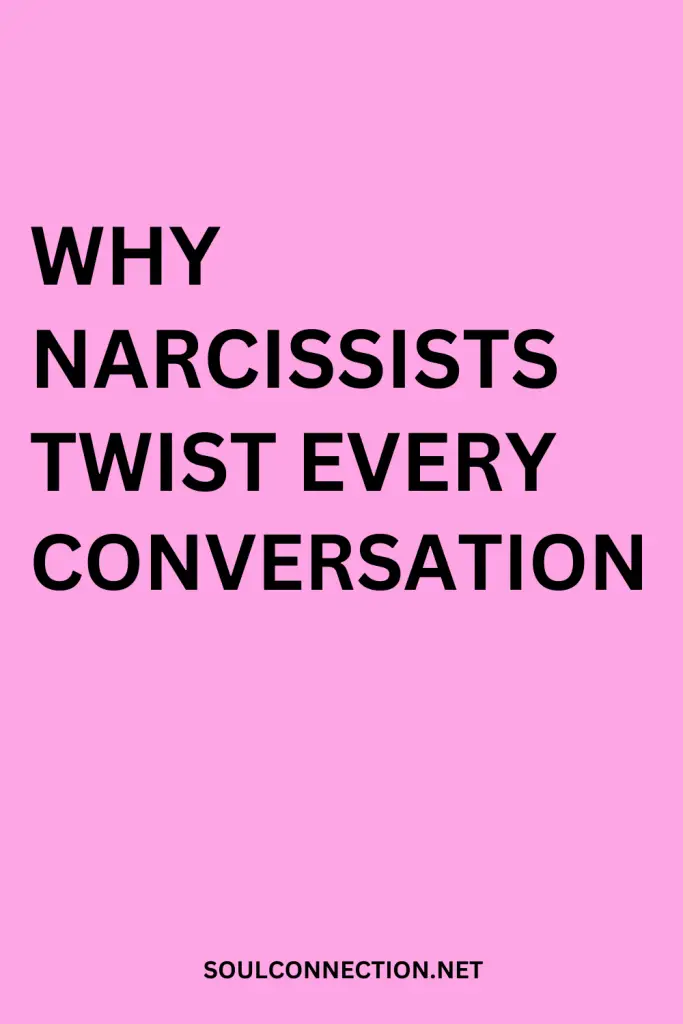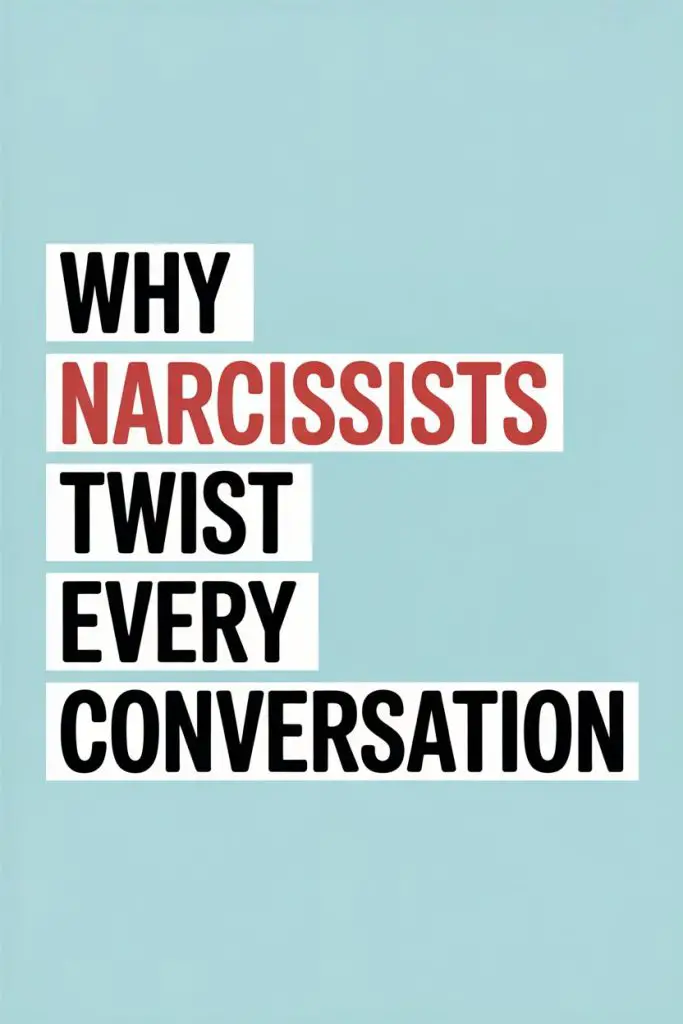Ever finish talking with a certain someone and wonder if you accidentally wandered into a parallel universe?
Conversations with narcissists can feel like a ride through the funhouse—except it’s rarely fun, and the mirrors are all designed to make you question your own reflection.
If every chat leaves you exhausted, confused, or quietly plotting your next escape, you’re not alone. There’s a method behind the madness, and—good news—you’re not losing your mind.
Narcissists aren’t just out to win an argument. They twist conversations for reasons that run deep, tie back to their self-image, and (frustratingly) have nearly nothing to do with you.
Grab your metaphorical cuppa and settle in: it’s time to untangle the why behind their conversational contortions, with a few tips to keep your sanity intact.
The Core of the Issue: Needing to Be Right
For a narcissist, being wrong feels like a catastrophic event—like dropping their phone screen-down onto concrete. It’s not about the facts. It’s about their identity.
Admitting a mistake means confronting vulnerability. That doesn’t suit someone who needs to see themselves as flawless. So, when faced with anything that hints at fault, cue the conversation twist.
Suddenly, the facts don’t matter. You’ll notice the subject veer, the goalposts move, and maybe even a wild accusation thrown your way for good measure.
It’s not personal. It’s protection—of their own ego.
Control as a Survival Strategy
Ever wonder why some folks seize the conversational steering wheel and refuse to let go? For narcissists, control isn’t just a preference; it’s a survival instinct.
If they can dictate the narrative, they can shape reality, making sure it always flatters them. Notice how topics you raise—say, your promotion at work or your sprained ankle—end up back on their achievements or aches?
That’s not coincidence. It’s conversational judo, and the narcissist is aiming for a gold medal.
Deflection and Blame: Olympic-Level Passing-the-Buck
If you try to discuss a problem, especially one involving their behavior, prepare for some impressive verbal gymnastics. Narcissists rarely own up. Instead, they’ll deflect responsibility so fast it’ll make your head spin.
Suddenly, you’re the one who’s “too sensitive,” or “always starting drama,” or “misremembering” what happened last week. If you’re feeling like you’ve just been lobbed into the hot seat, you’re experiencing classic blame-shifting.
Hint: The louder they protest, the closer you probably are to the truth.
The Need to Win, Even If There’s Nothing to Win
Every conversation turns into a battleground, even if nobody knows what the prize is. Disagree with a narcissist about music, pizza toppings, or (heaven help us) politics, and you’ll see just how fast a simple chat turns into World War III.
Compromise feels like defeat. Agreeing to disagree isn’t in their playbook. Winning—being right, being praised, being unchallenged—is the only outcome they’ll tolerate.
It’s not about the topic. It’s about the scoreboard in their head.
Emotional Manipulation: Keeping You Off-Balance
Notice how a narcissist can turn tears on and off like a leaky tap, or suddenly shift from anger to charm? Emotional whiplash isn’t accidental.
If you’re constantly on edge, unsure of their mood or how to proceed, you’re less likely to call out their nonsense. The more uncertain you are, the easier you are to control.
It’s a clever tactic, really—if you’re the one with the emotional hangover, you’re too distracted to notice the actual problem.
Manipulation isn’t always loud. Sometimes it’s a sigh, a well-timed silence, or a story designed to make you feel guilty for simply sticking to the truth.
Gaslighting: Making You Question Reality
The gold standard of narcissistic conversation twisting is gaslighting. If you’ve ever been told you’re “imagining things,” “too sensitive,” or “making stuff up”—especially in the face of clear evidence—you’ve seen gaslighting in action.
The aim? To make you doubt your memory, your judgment, even your sanity. If you can’t trust yourself, you’ll start trusting their version of reality, no matter how warped it gets.
One minute, you’re absolutely certain you agreed to meet at 6. The next, you’re apologizing for “getting it all mixed up.” Classic gaslighting. If it feels like déjà vu with a headache—yep, that’s it.
Projection: Their Flaws, Your Problem
Ever get accused of exactly what the narcissist does? That’s projection.
Suddenly, your gentle feedback about their lateness becomes, “Why are you always so unreliable?” If you mention their forgetfulness, you’re the one with the memory problem.
They’re not just dodging accountability; they’re handing you their baggage and insisting it matches your outfit. Carrying someone else’s emotional luggage gets heavy—fast.
They Get Bored Without Drama
Peaceful, mutually respectful conversations? Not exactly a narcissist’s cup of tea. If there’s no excitement, they’ll stir the pot.
Arguments, accusations, and circular debates fill the void. They enjoy the energy, the attention, and the chance to show off those verbal ninja moves.
If things get calm, don’t be surprised when a harmless comment suddenly becomes “proof” of your many failings.
Some folks collect stamps. Narcissists collect drama.
How to Hold Your Own in a Twisted Conversation
Now, about that sanity. You can’t stop someone from twisting words, but you can protect yourself from the spin. Here’s how to keep your cool and set boundaries, even as the conversation veers into the Twilight Zone.
Stick to the facts, briefly. Don’t get pulled into long explanations. State your point, then stop. The more you say, the more they have to twist.
Resist the urge to defend yourself endlessly. Defending every accusation is like trying to mop up the ocean—futile and exhausting. Sometimes, a calm “We remember things differently” is as far as you need to go.
Set boundaries—and keep them. If a conversation gets too heated or confusing, it’s okay to take a break. “I’m not comfortable talking about this right now” is a complete sentence.
Stay grounded. Write down what happened, keep messages, and talk things over with someone you trust. The more you shore up your own reality, the less likely you’ll get swept away by theirs.
Don’t expect a breakthrough. You might hope that, one day, they’ll see your side or apologize. It’s possible—but don’t bank on it. Your own peace of mind is more important than a “win.”
When Conversation Feels Like Combat
Sometimes, despite your best efforts, every discussion still feels like a sparring session with a master fencer. If this is every interaction—at work, at home, or with a so-called friend—it’s worth asking what you’re really getting out of the relationship.
You deserve conversations where you feel heard, not constantly on trial. If you’re walking on eggshells or doubting your own perception, that’s a sign the problem isn’t with you.
Support from a therapist or trusted confidante can help you sort through the confusion and reclaim your reality, one conversation at a time.
You’re Not the Problem
Narcissists twist conversations to protect their egos and keep the upper hand. It’s not about your worth, intelligence, or memory—it’s about their need to be right, in control, and unchallenged.
Learning how to spot the spin (and not get dizzy) is a skill worth mastering. With boundaries, support, and a healthy dose of self-trust, you can break free from the conversational merry-go-round and find your way back to solid ground.
You’ve got this. And you deserve better than a never-ending debate over who left the milk out.


